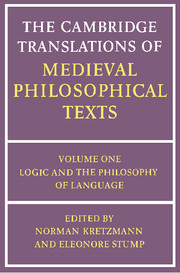Book contents
- Frontmatter
- Contents
- Preface
- General Introduction
- 1 BOETHIUS: On Division
- 2 Anonymous: Abbreviatio Montana
- 3 PETER OF SPAIN Predicables Categories
- 4 LAMBERT OF AUXERRE: Properties of Terms
- 5 Anonymous: Syncategoremata Monacensia
- 6 NICHOLAS OF PARIS: Syncategoremata (selections)
- 7 PETER OF SPAIN: Syllogisms; Topics; Fallacies (selections)
- 8 ROBERT KILWARDBY: The Nature of Logic; Dialectic and Demonstration
- 9 WALTER BURLEY: Consequences
- 10 WILLIAM OCKHAM: Modal Consequences
- 11 ALBERT OF SAXONY: Insolubles
- 12 WALTER BURLEY: Obligations (selections)
- 13 WILLIAM HEYTESBURY: The Compounded and Divided Senses
- 14 WILLIAM HEYTESBURY: The Verbs ‘Know’ and ‘Doubt’
- 15 BOETHIUS OF DACIA: The Sophisma ‘Every Man is of Necessity an Animal’
- Index
15 - BOETHIUS OF DACIA: The Sophisma ‘Every Man is of Necessity an Animal’
Published online by Cambridge University Press: 05 June 2012
- Frontmatter
- Contents
- Preface
- General Introduction
- 1 BOETHIUS: On Division
- 2 Anonymous: Abbreviatio Montana
- 3 PETER OF SPAIN Predicables Categories
- 4 LAMBERT OF AUXERRE: Properties of Terms
- 5 Anonymous: Syncategoremata Monacensia
- 6 NICHOLAS OF PARIS: Syncategoremata (selections)
- 7 PETER OF SPAIN: Syllogisms; Topics; Fallacies (selections)
- 8 ROBERT KILWARDBY: The Nature of Logic; Dialectic and Demonstration
- 9 WALTER BURLEY: Consequences
- 10 WILLIAM OCKHAM: Modal Consequences
- 11 ALBERT OF SAXONY: Insolubles
- 12 WALTER BURLEY: Obligations (selections)
- 13 WILLIAM HEYTESBURY: The Compounded and Divided Senses
- 14 WILLIAM HEYTESBURY: The Verbs ‘Know’ and ‘Doubt’
- 15 BOETHIUS OF DACIA: The Sophisma ‘Every Man is of Necessity an Animal’
- Index
Summary
Introduction
Not much is known about Boethius of Dacia beyond the facts that he was a Dane who was a master of arts in Paris around 1270 and that he was one of the main proponents of the Latin Averroism or Radical Aristotelianism condemned in the Condemnation of 1277. His works include treatises on the highest good, on dreams, and on the eternity of the world, a treatise on speculative grammar, and various treatises on natural philosophy, besides his books on logic.
The sophisma in the selection translated below develops out of the sentence ‘Every man is of necessity an animal.’ Boethius raises four questions more or less closely associated with it: (1) is it true when no man exists? (2) is knowledge destroyed when the things known are destroyed? (3) does a term lose its connection with what it signifies when its significata are destroyed? and (4) is the nature of a genus in its species something actual other than the final differentia of the species?
In dealing with the first question, Boethius presents a number of arguments to show that the proposition ‘Every man is an animal’ is necessarily true and therefore also true when no men exist. On the negative side of the sophisma, Boethius gives an analysis of truth as composition in discourse that reflects composition in reality; when man and animal are not compounded in reality, the proposition ‘Every man is an animal’ is not true either.
- Type
- Chapter
- Information
- The Cambridge Translations of Medieval Philosophical Texts , pp. 480 - 510Publisher: Cambridge University PressPrint publication year: 1989



